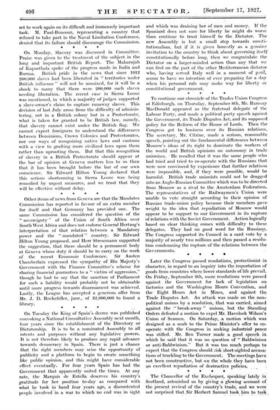On Monday, Slavery was discussed in Committee. Praise was given
to the treatment of the subject in the long and important British Report. The Maharajah of Kapurthala spoke of the progress made in India and Burma. British pride in the news that since 1912 200,000 slaves had been liberated in "territories under British influence" will not be unmixed, for it will be a shock to many that there were 200,000 such slaves needing liberation. The recent case in Sierra Leone was mentioned, in which a majority of judges supported a slave-owner's claim to capture runaway slaves. This decision of last July arose from the difficulty of adminis- tering, not in a British colony but in a Protectorate, what is taken for granted to be British law, namely, that slavery cannot exist under the British flag. We cannot expect foreigners to understand the differences between Dominions, Crown Colonies and Protectorates, nor our ways of recognizing native laws and customs with a view to grafting more civilized laws upon them rather than uprooting them. But that this recognition of slavery in a British Protectorate should appear at the bar of opinion at Geneva matters less to us than that it has been brought before the bar of our own conscience. Sir Edward Hilton Young declared that this serious shortcoming in Sierra Leone was being remedied by urgent measures, and we trust that they will be effective without delay.














































 Previous page
Previous page